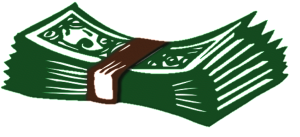In the previous article, we discussed some of the specialized types of mortgages. Regardless of how you finance your new northern Michigan home, there are many costs to consider in addition to your regular monthly payments to the bank. In this article, we’ll explore both the recurring (repeating) and non-recurring (one-time) costs of buying a home.
Monthly Payments
Monthly payments of principle and interest are typically the most significant cost of a mortgage. These payments will be required until the full amount of the loan is repaid. At first, most of these payments go toward paying off the interest of the loan. For example, in the first year of amortization, or repayment, $500 out of a $600 monthly payment may go toward interest, while only
 $100 goes toward repaying the principle of the loan. This is important to understand because it means that as a homeowner, you will build equity (the portion of the home you actually own) more slowly toward the beginning of amortization. As the principle is repaid, a lower percentage of the monthly payments goes toward interest.
$100 goes toward repaying the principle of the loan. This is important to understand because it means that as a homeowner, you will build equity (the portion of the home you actually own) more slowly toward the beginning of amortization. As the principle is repaid, a lower percentage of the monthly payments goes toward interest.
Other Recurring Costs
Property taxes are another important cost to consider in the purchase of a home. Property taxes are calculated based on the millage rate, a uniform rate at which property is taxed in a region, and the assessed value of the property. A lender often requires monthly payments from the borrower for property taxes. The lender will hold these funds in escrow, meaning they set the funds aside in a separate account and transfer the money to the government when payment is due. However, you will still owe property taxes even after the mortgage has been completely repaid. Exact property taxes vary by location, so you can estimate your yearly Michigan property taxes using the calculator here.
Another important recurring cost is property insurance, which insures the home against fire, theft, and other risks. Many lenders include costs of property insurance in the monthly payment for a mortgage.
If a home was purchased with a down payment of less than 20%, payments for mortgage insurance may also be required. These costs vary depending on the lender and type of loan – for example, a VA loan requires payment of an up-front funding fee, and FHA loans carry both an up-front and monthly cost. Mortgage insurance may only be required until you have 20% equity in the home, but be sure to ask your lender for details.
Non-Recurring Costs
In addition to your recurring costs and down payment, closing costs are extremely important to consider. On average, closing costs will be 2-5% of your home’s purchase price. As a home buyer, you must be prepared to pay additional fees to the lender for running credit reports, loan origination fees, discount points, an escrow deposit for insurance and property taxes, underwriting fees, and more. Also, you may need to purchase other services, such as a home inspection or property surveyor. Closing costs can vary based on the lender’s requirements and the needs of the property. You may also be able to negotiate to have the seller pay part of the closing costs.
Homeownership also carries maintenance and upgrade costs, which can be unexpected. Be sure to obtain a professional inspection of your prospective home, so you are aware of potential problems and can anticipate the costs. If your home will need a new roof in the next 3 years, you should know that before you close the deal!
If you are interested in learning more about the costs of a mortgage, contact your local bank or mortgage lender.
If you are interested in hiring a professional realtor who can guide you through this process, Donna Gundle-Krieg loves working with people and would be happy to provide you with more information. She has many exciting listings available in great Antrim County locations, which you can view here. You can contact her at (231) 350-8507 or dokrieg@gmail.com to learn more.
